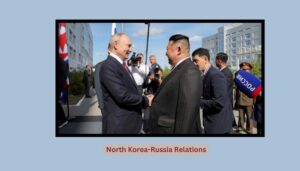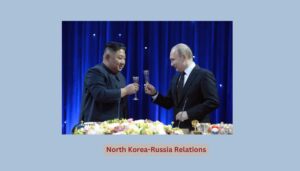North Korea-Russia Relations: History, Current State, and Future Prospects
The relationship between North Korea and Russia has seen various transformations throughout history, often shaped by the larger geopolitical landscape and regional needs. While North Korea remains one of the most isolated countries globally, its interactions with Russia showcase complex dynamics that affect both countries’ politics, security, and economic interests. This article dives into the historical context, current situation, and future outlook for North Korea-Russia relations, providing a comprehensive view of this unique diplomatic relationship.

Introduction to North Korea-Russia Relations
The alliance between North Korea and Russia is more than just a geopolitical strategy—it’s a historical bond rooted in shared ideologies and mutual benefits. As two neighbors in the Northeast Asian region, both countries have found it necessary to engage in diplomatic and economic exchanges, despite the many challenges posed by international sanctions and shifting global allegiances.
Historical Background of North Korea-Russia Relations
The historical roots of North Korea-Russia relations trace back to the early 20th century when the Russian Empire had significant influence over the Korean Peninsula. After the Soviet Union was established, it played a crucial role in supporting North Korea during and after the Korean War. This assistance not only helped North Korea gain independence but also laid the foundation for their long-term alliance.
The Cold War and Ideological Ties
During the Cold War, North Korea found an ideological ally in the Soviet Union. The socialist ideals promoted by the Soviet Union resonated with North Korea’s political system, creating a strong alliance based on mutual support. This period marked a high point in North Korea-Russia cooperation, with the Soviet Union providing economic aid, military equipment, and technical expertise to North Korea.
Post-Soviet Shifts in the Relationship
The dissolution of the Soviet Union in 1991 marked a turning point in North Korea-Russia relations. With Russia’s transition to a more open market economy, it shifted its focus to other international partnerships, leaving North Korea somewhat sidelined. This period saw a cooling of relations, but both nations maintained some level of diplomatic interaction due to their geographical proximity and shared concerns over regional security.
Economic Cooperation and Trade
In recent years, economic cooperation between North Korea and Russia has focused on trade in natural resources, labor, and infrastructure development. North Korea has been a supplier of inexpensive labor for Russia, particularly in regions like Siberia. Although trade between the two countries is relatively limited due to sanctions, there is still a mutual interest in exploring economic ties that could potentially bypass international restrictions.
Military and Strategic Interests
Military cooperation has been a central aspect of North Korea-Russia relations. Russia’s strategic interests in Northeast Asia align with North Korea’s desire to maintain its sovereignty against Western influence. Both countries occasionally hold joint military exercises and exchanges, reinforcing their military partnership. However, Russia is cautious not to breach international sanctions that could harm its relations with other global powers.
North Korea’s Nuclear Program and Russia’s Stance
North Korea’s nuclear ambitions have been a contentious point on the global stage, and Russia’s position on North Korea’s nuclear program has been one of cautious support. While Russia officially condemns nuclear proliferation, it often adopts a neutral stance, urging dialogue over punitive actions. This approach serves Russia’s interests by maintaining stability in the region and keeping its diplomatic channels with North Korea open.
Diplomatic Relations in the 21st Century
In recent years, North Korea-Russia diplomatic relations have strengthened, primarily due to shared concerns about U.S. influence in Northeast Asia. Russia has sought to position itself as a mediator in talks involving North Korea, China, South Korea, and the United States, highlighting its role as a key player in regional security. This diplomatic balancing act underscores Russia’s desire to maintain a presence in Northeast Asia without directly antagonizing any particular country.
Russia’s Role in North Korean Sanctions
The international community has imposed a series of sanctions on North Korea, aimed at curtailing its nuclear activities. Russia, as a member of the United Nations Security Council, has had a complex role in these sanctions. While it votes in favor of many sanction measures, Russia often advocates for humanitarian exceptions, signaling its unwillingness to completely isolate North Korea.

Cultural and People-to-People Exchanges
Cultural exchanges between Russia and North Korea are modest but noteworthy. Both countries occasionally participate in cultural events, and North Korean students have historically been allowed to study in Russian universities. These interactions, though limited, help maintain a foundation for understanding and mutual respect between the two societies.
The Impact of U.S. Relations on North Korea-Russia Ties
U.S. policies towards both North Korea and Russia have influenced the nature of North Korea-Russia relations. The imposition of sanctions on both countries has driven them closer together, as they share a common interest in resisting Western influence. However, both countries also have to carefully navigate this alliance to avoid increasing tensions with the U.S. and its allies.
Recent Developments and Summit Meetings
In recent years, there have been several high-profile summits between North Korean and Russian leaders, signaling a renewed commitment to cooperation. These meetings have focused on discussing economic cooperation, security, and the mutual benefits of a stronger alliance. Such developments are often interpreted as strategic moves aimed at reinforcing their position in the region.
Future Prospects of North Korea-Russia Relations
The future of North Korea-Russia relations appears to be shaped by regional security concerns and the evolving international landscape. As both countries face continued pressure from the West, it’s likely they will seek ways to deepen their economic and strategic ties. However, this relationship is also vulnerable to changes in global politics and potential shifts in leadership priorities.
Read more – North korean Troops Kursk
Conclusion
In summary, North Korea-Russia relations are complex, influenced by a shared history, common ideological roots, and a mutual interest in balancing Western influence in Northeast Asia. While both countries face significant challenges, including international sanctions and economic limitations, their alliance remains resilient. The future of this relationship will likely depend on the evolving geopolitical landscape, but for now, North Korea and Russia continue to find strength in their unique partnership. This evolving alliance demonstrates that even in a rapidly changing world, historical bonds and mutual interests can help two nations navigate the complexities of modern diplomacy.